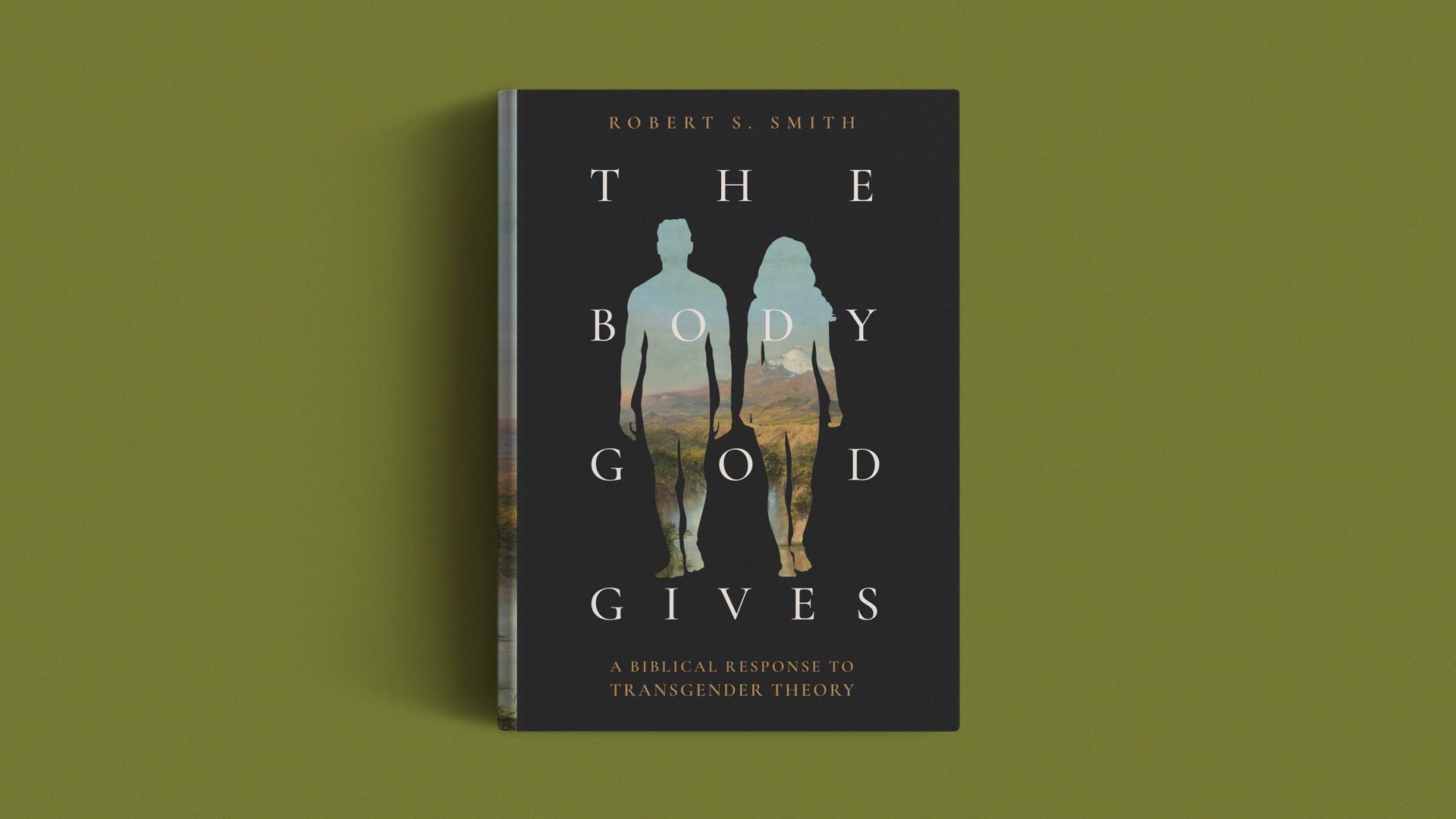In The Body God Gives: A Biblical Response to Transgender Theory, Anglican scholar Robert S. Smith joins conviction and compassion in a sober, cogent analysis of how God’s Word speaks to contemporary gender debates. His crucial conclusion: “God’s desire for my gender—that is, whether I should perceive and present myself as a man or a woman—is revealed by the design of my body.”
Smith carefully analyzes Genesis 1:27, which affirms that God created all people “male and female.” Crucially, he notes that Scripture echoes this teaching in its account of Adam and his descendants after the Fall, declaring, “When God created mankind, he made them in the likeness of God. He created them male and female and blessed them” (5:1–2). This latter passage, as Smith writes, shows that man made in the likeness of God “is a community of persons, not an androgynous, asexual, or bisexual individual.”
Together, these Genesis passages demonstrate that the body God gives to every person is part of his good creation, regardless of how he or she perceives it. As such, bodily realities undergird the concept of gender, which is foundational to personal identity. They determine the trajectory we should follow in thinking about our own gender roles and expressions: “To the extent that we can speak of gender identity and gender roles as constructed, faithfulness … requires that all such constructions respect and reflect biological reality.”
A faculty member at Sydney Missionary and Bible College, Smith clearly demonstrates that the fact of our male and female bodies entails a specific approach to gender. His tone is irenic and avoids inflammatory hostility, but he is firm in opposing the constellation of contemporary perspectives that developed out of works in transgender theory like The Transsexual Phenomenon, published in 1966 by Harry Benjamin, an eccentric 81-year-old endocrinologist.
Benjamin argued, “For the simple man in the street, there are only two sexes. A person is either male or female, Adam or Eve. … The more sophisticated realize that every Adam contains elements of Eve and every Eve harbors traces of Adam, physically as well as psychologically.” On this basis, Benjamin contended that every person has androgynous tendencies somewhere deep within them. In some way, he theorized, this contributes to the discomfort some people feel with their own bodies and the corresponding desire to change sexes. In other words, sex and gender are inherently different categories.
In sharp contrast, Smith sees gender as a conceptual category that should be grounded in, and never separated from, biological sex. He defines gender as “the culturally mediated set of conceptions, expectations, and roles associated with being either male or female. Such a definition distinguishes gender from sex without disconnecting gender from sex.” The reality of the body’s sex comes first, and then gender expression flows from the body itself. Accordingly, Smith rejects the idea that subjective feelings of gender dissonance give moral grounds for gender reassignment surgery.
In some respects, debates about gender identity seem distinctively modern. On a deeper level, however, they flow from debates as old as ancient philosophy—in particular, the contest between two schools of thought known as realism and nominalism. While The Body God Gives gestures toward this older debate, Smith could have strengthened the book by addressing it more explicitly.
The conflict between realism and nominalism boils down to what philosophers call universals and particulars. Put simply, universals are qualities or characteristics that can exist in many things or people at the same time. “Maleness” and “femaleness” are universals, but particulars are distinct entities—like a specific husband or wife, mother or father, son or daughter.
Philosophically speaking, realists affirm both universals and particulars, regarding the latter as instances or expressions of the former. Nominalists, however, only recognize particulars. In their view, what realists define as real, objective categories and concepts are nothing more than arbitrary human labels or conventions.
The modern transgender debate demonstrates how realism and nominalism can drive dramatically different ethical conclusions. A realist might say, “John is a man,” connecting something particular (the name John) with something universal (the status of being a man rather than a woman). In this view, the universal category of man encompasses all those who possess male genitalia, X and Y chromosomes, and other shared biological characteristics. These universal properties unite the particular person named John to all others who share them.
In contrast, transgender theory reflects an extreme nominalism. Denying the universal categories of male and female means there are only particular persons, none of whom share the universal properties of either biological sex or gender.
Without saying as much, The Body God Gives makes a strong case for Christian realism. The universal categories of male and female are woven into creation by a wise God. We describe particular people God created as male and female because these categories are real, not merely convenient inventions.
The Body God Gives also addresses intersex conditions, referring to rare developmental disorders that cause children to be born with some mix of male and female characteristics. As Smith concludes, “intersex conditions do not constitute a third sex.” While I concur with his judgment, he could have presented a stronger argument for it. Intersex advocates may be correct that cosmetic surgery on very young intersex children is sometimes unwise, given that most of the conditions being treated are not life-threatening. But some intersex conditions do impede the healthy functioning of the colon and urinary tract. Specific, surgically correctible problems like these underscore the degree to which intersex conditions represent variations from the normally occurring binary of male and female. In this sense, they are more analogous to a cleft palate than a third sex.
Smith does not resolve the debate about using the preferred pronouns or names of those claiming to have changed genders. But perhaps his book is stronger for staying focused on explaining the goodness of male and female bodies and clarifying their normative guidance on living as men and women. His clarity on these core subjects offers a helpful starting point for thinking through practical outworkings of Christian living in a world where transgender identities are common and celebrated.
Smith’s emphasis on evangelism is also refreshing. We can share Christ and offer the hope of the new birth to anyone who repents and believes, even people who have pursued various steps in gender reassignment. As Smith notes, Scripture attests to this fact by speaking of eunuchs who live faithful, God-honoring lives. In Isaiah, God promises “an everlasting name” for eunuchs “who choose what pleases me and hold fast to my covenant” (56:4–5). And the New Testament records the apostle Philip evangelizing and baptizing the Ethiopian eunuch in Acts 8:26–39.
This brings us to a perpetually difficult question: What should a church do if a transgender person comes to faith in Christ? Smith is correct that genuine repentance means pursuing faithfulness and “living (as much as is possible) in harmony with one’s God-given sex.”
Going further, though, it’s worth emphasizing that some reversals of gender reassignment surgeries may cause more harm than good. Because these procedures are notorious for causing post-operative problems, I would not suggest a reversal surgery if, for example, the new believer has no colorectal or urinary tract issues.
Meanwhile, a transgender person accepting Christ should begin transitioning back toward a gender identity as closely aligned as possible to his or her biological sex. Even so, the church must realize that things might never be exactly as they were. Furthermore, church leaders should approach any use of cross-sex hormones with great caution, as these can involve significant health risks. (No pastor wants an effort to repent from past sins to result in a pulmonary embolism.) But thankfully, God’s grace—alongside prudent medical advice—is sufficient to navigate such problems.
Transgender discussions can be disorienting, but we are not the first generation of believers to face them. In ancient Rome, the popular cult of the goddess Cybele included male devotees who castrated themselves and dressed as females. There are many differences, of course, between this cult and modern transgender advocates. Yet if we traveled back in time to the church at Rome and described our current gender landscape, those early believers might reassure us that they have seen something similar.
The gospel was sufficient for addressing gender confusion in the first century, and the same gospel is sufficient for addressing it today. The Body God Gives is a helpful tool for the church as it defends the goodness of our created bodies and shapes our moral thinking about gender.
J. Alan Branch is professor of Christian ethics at Midwestern Baptist Theological Seminary. He is the author of 50 Ethical Questions: Biblical Wisdom for Confusing Times and Affirming God’s Image: Addressing the Transgender Question with Science and Scripture.
















